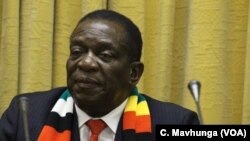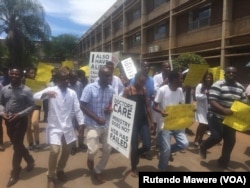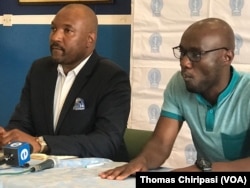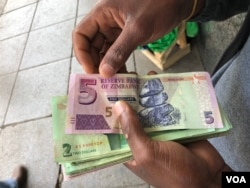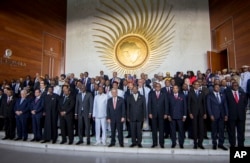Zimbabwean President Emmerson Mnangagwa has been forced to cut short his annual leave in an effort to address a month-long strike by some junior, middle and senior doctors that has paralyzed the country’s public health sector.
President Mnangagwa announced on his Twitter account that he was returning to work Tuesday just a few days after announcing that he was taking a month-long vacation on December 27th. Said the president on Twitter: "I have cut short my leave to be in immediate and active consultation with the Acting President in resolving the situation in the Health Sector."
Doctors are calling for increased monthly salaries and on-call pay, and for the government to address the acute shortage of medical supplies and equipment in public hospitals. They are also demanding payment of salaries in United States dollars.
Information and Publicity Permanent Secretary Nick Mangwana told VOA Zimbabwe Service that the president, who was on holiday in his Midlands rural home, was back in the capital. “The president has had to cut short his annual leave in order to play an oversight role in the negotiations.”
Ironically only a day after Mr. Mnangagwa suspended his vacation, medical consultants and registrars (the country’s most experienced doctors) at state hospitals who gave the government a 48-hour ultimatum last Friday to address the concerns of their striking juniors, downed their tools and joined the industrial action.
The senior doctors, who had been holding the fort for a month, said in a press statement, “We share the same grievances as our juniors that of the need for a cost of living adjustment, need for uninterrupted availability of essential drugs and sundries and the need to address the vehicle status of all doctors. We have resolved therefore as a group to protect our patients and ourselves to withdraw our services until an agreement is reached.”
One of Mr. Mnangagwa’s vice presidents who was also acting president, Retired General Constantino Chiwenga, tasked by cabinet to resolve the impasse and had previously threatened to suspend and fire the striking doctors, accused them at a press conference Tuesday of unethical practices.
“International best practices which govern doctors and interns, provide that doctors should not abandon patients and posts; and that instead they should bring forward their grievances while making sure loss of life or unnecessary pain and suffering is avoided,” said Retired General Chiwenga.
He added, “By going against the Hippocratic Oath, the striking doctors have shown their callous insensitivity to human life, pain and suffering. In the meantime, Government will not allow any demonstrations at medical facilities whose purpose is to treat patients and ensure their full recovery.”
Chiwenga also vowed that the cash-strapped government will not pay the striking doctors in U.S dollars. “Government will not remunerate any of its workers in US dollars … Government does not print U.S dollars.”
President Mnangagwa sent officials from his office Wednesday to start dialogue with the striking doctors. In a press statement, the Zimbabwe Hospital Doctors Association acknowledged meeting the president’s emissaries.
“We had an urgent meeting with representatives from the Presidential Office. They have realized the misrepresentation of facts by some busy bodies in the ministry and Hospital Services body and had come to understand our position. We laid out the facts clearly and they promised to get back to us as soon as the president responds to the matters.”
The striking junior doctors are earning about $329 in local currency which is rated on the unofficial parallel market to about US$100. In neighboring South Africa, which attracts the most skilled labor from Zimbabwe including health workers, junior doctors on internship earned the equivalent of $2,834 last year, according to Business Day newspaper.
Zimbabwe’s economy has taken a turn for the worse characterized by soaring inflation that has seen the local currency or the so-called bond note losing value though the government insists it is one to one with the U.S dollar.
For decades, Zimbabwe’s doctors have often downed tools with the country’s parliament calling on government to consider increasing the budget allocation for the Ministry of Health, arguing it should have the highest allocation, or at least the 15 percent benchmark set out in the Abuja Declaration of 2001 in which African leaders undertook to increase budgets for health.
Executive director of the Community Working Group on Health, Itai Rusike, concurs with parliamentarians saying Harare’s continued over-reliance on development partners raises the spectre of a health crisis should there be donor fatigue.
Last year in its budget assessment report, UNICERF also warned Harare of the dangers of relying mostly on donors. “The implication of the inadequacy in public health spending is that the health sector will continue to significantly rely on out-of-pocket (OOP) expenditures and donor assistance, which are both unsustainable.”
The reported further said, “Already, donor support has been on a decline, putting the health sector in a financially vulnerable position. With no major financing innovation in the sector, a shock or withdrawal of donor support is highly likely to reverse the significant gains achieved to date. Safeguarding such gains therefore calls for the government to look for innovative health financing mechanisms, such as prepayment mechanisms and gradually reducing the share of external funding and OOP.”
Finance Minister Professor Mthuli Ncube in his 2019 National Budget allocated only US$694,5 million or nine percent of the budget to the Health sector, a figure that is far below the percentage agreed under the Abuja Declaration.
Zimbabwean leaders, including former president Robert Mugabe, Mr. Mnangagwa and General Chiwenga usually shun the country’s hospitals and prefer to be treated outside the country in the Far East and neighboring South Africa.




